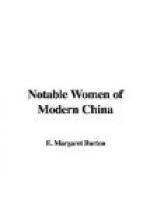There were many missionaries from various parts of China gathered in Shanghai at this time, and the women improved the opportunity thus afforded by the presence of so many workers for a conference on the various phases of women’s work. Dr. Kahn was asked to give an address on Girl Slavery at this conference, and made a great impression by her powerful plea for the abolition of this wicked practice. Her appeal had added force because she was a Chinese woman herself, and this evil custom had come close to her life. “She was my best friend in school,” she said of one victim, “and her mind was as beautiful as her person. We were baptized together and she confessed to me that she would like to devote her life to Christian work, adding so sadly that she must try first to help her opium-smoking father. Where were gone her longings and aspirations when she was sold by him to be the concubine of a man sixty years of age! Surely on this eve of China’s regeneration, we, the more favoured ones, must plead with all our might that all these unnatural customs shall be swept away with the last relics of our country’s barbarism.”
[Illustration: A Nurse in Dr. Kahn’s Hospital]
The doctors were soon able to recommence work in Kiukiang, and with their fine new hospital they worked under far more favourable conditions than heretofore. A letter from Dr. Kahn tells of their enjoyment of the new building: “It is now a pleasure to see the little crowds of women and children sitting comfortably in the easy seats of the dispensary waiting room, and to notice how they enjoy the talks of the Bible woman. In former years they were always huddled together in a dark room, or else were scattered here and there in our front yard, and the Bible woman had great difficulty to get them to listen quietly. The new drug room is a constant delight. The operating room, too, is our pride, because it is so light. The confidence which people had in our work before last year’s troubles broke out, appears to revive again.”
The following summer, Miss Robinson, of Chinkiang, visited the doctors in their new quarters. A letter written from their home reads: “We find them as skilful in housekeeping as in hospital-keeping, and excelling in the happy art of making their guests at home. Such all-round women are a priceless boon to their native sisters. I want to have our graduates attend the coming annual meeting in Kiukiang, improving this opportunity of bringing them in contact with the doctors, who have long since become the ideals of our school girls.... Referring to the fear some native Christians have shown of sending their girls to a school having manual labour in its curriculum, Dr. Ida exclaimed hotly, ’This fear of work is the bane of China.’ Here are two doctors of exalted privileges, educated abroad, honoured alike by native and foreigner, and yet putting their hand to cooking and housework of every kind, as the need may be, without a thought of being degraded thereby; a glorious object-lesson to accompany the teachings of the mission schools.”




